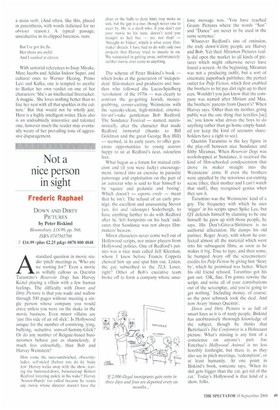Not a nice person in sight
Frederic Raphael
DOWN AND DIRTY PICTURES by Peter Biskind Bloomsbury, £18.99, pp. 560, ISBN 0747565708 ? £16.99 (plus £2.25 p&p) 0870 800 4848 Astandard question in movie studio 'pitch' meetings is, 'Who are we rooting for?' Even a movie as wilfully callous as Quentin Tarantino's Reservoir Dogs has Harvey Keitel playing a villain with a few human feelings. The difficulty with Down and Dirty Pictures is that you wade and wallow through 500 pages without meeting a single person whose company you would crave unless you were on the make in the movie business. Even minor villains are 'just this side of an oil slick'. Is Hollywood unique for the number of conniving, lying, bullying, seductive sons-of-Sammy-Glick? Or do any number of Reigate-based businessmen behave just as shamelessly, if much less colourfully, than Bob and Harvey Weinstein?
How come the tuna-sandwiched, obscenityladen, self-styled (before you do it) 'hairy Jew' Harvey walks away with the show, leaving the buttoned-down, buttoned-up Robert Redford loitering palely in his wake? Harvey `Scissor-Hands' (so called because he recuts any movie whose director doesn't have the clout or the balls to deny him) may make us sick, but the guy is a star, though never one to steer by. He is a devil who, if you don't cut your movie to his tune, doesn't send you straight to hell hut — no, not that! — 'Straight to Video', which is what every filmmaker dreads. I have had to do with only two projects that Harvey tried to muscle in on. We succeeded in getting away, unfortunately: neither movie ever came to anything.
The scheme of Peter Biskind's book — which looks at the generation of `independent film-makers and producers and hustlers who followed the Lucas-Spielberg 'revolution' of the 1970s — was clearly to contrast the go-getting Jewish, moneygrubbing, corner-cutting Weinsteins with the squeaky-clean, high-minded, cinemafor-art's-sake gentleman Bob Redford, The Sundance Festival — named, narcissistically, after the character that made Redford immortal (thanks to Bill Goldman and the great George Roy Hill) — seemed, in its early years, to offer generous opportunities to young auteurs happy to sit at Redford's neat, odourless feet.
What began as a forum for mutual criticism and (if you were lucky) encouragement, turned into an exercise in parasitic patronage and exploitation on the part of an autocrat who is said to fear himself to be 'square and pedantic and boring'. Which doesn't — arperto crede — mean that he isn't. The refusal of an early protégé, the excellent and unassuming Steven (sex, lies and videotape) Soderbergh, to have anything further to do with Redford after he 'left footprints on his back' indicates that Sundance was not always filmmakers' heaven.
Minor characters never come well out of Hollywood scripts, nor minor players from Hollywood politics. One of Redford's patsies was a nice man called Jeff Kleeman, whom I knew before Francis Coppola chewed him up and spat him out. Listen, the guy subscribed to the TLS. Loser, right? Other of Bob's executive team broke off to form a company whose ansa fone message was, 'You have reached Grainy Pictures where the words "Sun" and "Dance" are never to be used in the same sentence.'
Whatever Redford's sins of omission, the truly down'n'dirty people are Harvey and Bob. Yet their Miramax Pictures really did open the market to all kinds of pictures which might otherwise never have found a screen, At the beginning, Miramax was not a producing outfit, but a sort of cinematic paperback publisher, the perfect outlet for Pulp Fiction, which first enabled the brothers to hit pay dirt right up to their ears. Wouldn't you just know that the company was named after Miriam and Max, the brothers' parents from Queen's? When Harvey says, 'Other than my mother, going public was the one thing that terrifies [sic] us,' you know what drives the boys to do anything rather than go home empty-handed (or keep the kind of accounts shareholders have a right to see).
Quentin Tarantino is the key figure in the play-off between nice Sundance and filthy Miramax. When Reservoir Dogs was workshopped at Sundance, it received the kind of film-schooled condescension that drove its maker straight into the Weinsteins' arms. If even the brothers were appalled by the notorious ear-cutting scene (they, their mother and I can't watch that stuff), they recognised genius when they saw it.
Tarantino was the Weinsteins' kind of a goy. The frequency with which he uses 'nigger' in his scripts upset Spike Lee, but QT defends himself by claiming to be one himself: he grew up with those people, he says. His Don't-Give-a-Shittiness is no authorial affectation. He dumps his old partner, Roger Avary, with whom he confected almost all the material which went into his subsequent films, as soon as he makes it big. True to type, and then some, he bumped Avary off the screenwriters' credits for Pulp Fiction by giving him 'Story by', which he promised was better. When his old friend refused, Tarantino got his gun out: 'OK, fine, I'm gonna rewrite the script, and write all of your contributions out of the screenplay, and you're going to get nothing.' Including money, of course; so the poor schmuck took the deal. And now Avary 'misses Quentin'.
Down and Dirty Pictures is as full of smart lines as it is of nasty people. Biskind has unobtrusively thorough knowledge of the subject, though he thinks that Bertolucci's The Conformist is a Holocaust picture. What's missing is any hint of a conscience on anyone's part. Joe Esterhaz's Hollywood Animal is no less horribly forthright, but there is, as they also say in pitch meetings, 'redemption', or at least humanity. At one point in Biskirid's book, someone says, 'When its shit gets bigger than the cat, get rid of the cat.' Today's Hollywood is that kind of a show, folks.


















































































 Previous page
Previous page